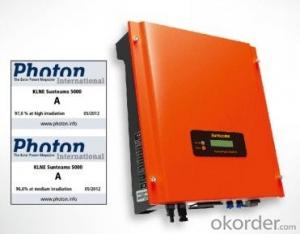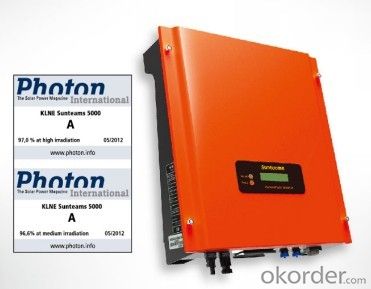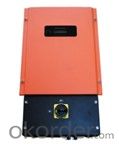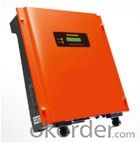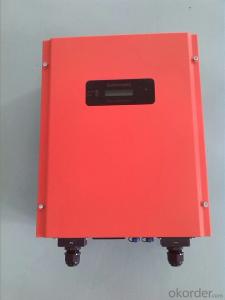Ryobi Solar Inverter Sunteams 4000 On Grid Inverter with WiFi US Standard
- Loading Port:
- Shanghai
- Payment Terms:
- TT OR LC
- Min Order Qty:
- -
- Supply Capability:
- 10000 set/month
OKorder Service Pledge
Quality Product, Order Online Tracking, Timely Delivery
OKorder Financial Service
Credit Rating, Credit Services, Credit Purchasing
You Might Also Like
Sunteams 1500,2000,2500,3000,3600,4000,4600,5000
Sunteams US 1500,2000,2500,3000,3600,4000,4600,5000
1MPPT, single phase
IP 65
50Hz & 60 Hz
with Plug in wifi/ wifi box
with wire box/ without wire box
UL certified
■ For countries with UL certification (UL 1741 / IEEE 1547)
■ For countries with UL certification (UL 1741 / IEEE 1547)
Efficient
■ The CEC efficiency of the inverter can reach 95.0 %-97.5 %
■ Transformerless desi
■ The CEC efficiency of the inverter can reach 95.0 %-97.5 %
■ Transformerless desi
Simple
■ ‘Plug and play’connection for easy installation and maintenance
■ Designed for hanging with simple and easy installation
■ Fanless cooling concept
■ ‘Plug and play’connection for easy installation and maintenance
■ Designed for hanging with simple and easy installation
■ Fanless cooling concept
Communicative
■ RS232/RS485 interfaces as standard
■ Optional Bluetooth technology
■ RS232/RS485 interfaces as standard
■ Optional Bluetooth technology
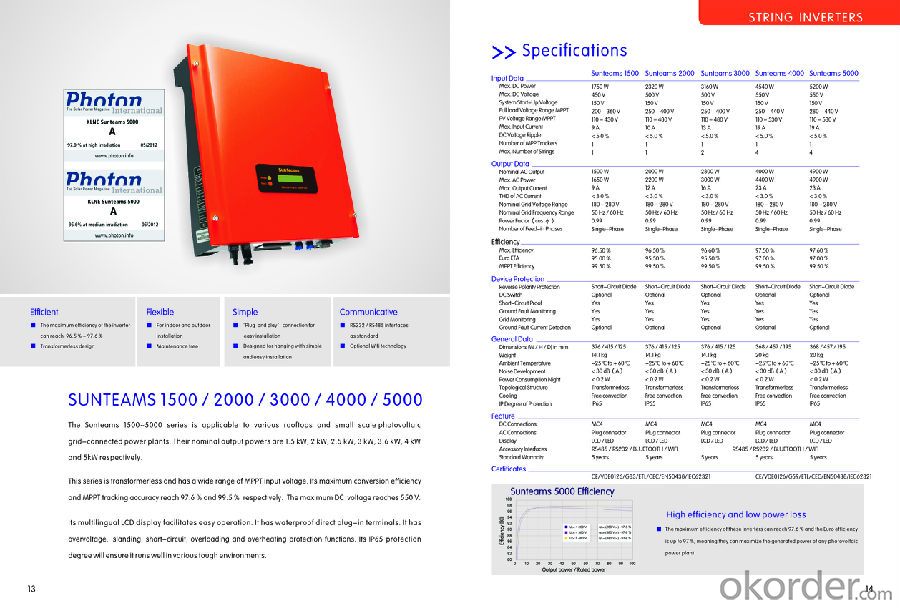
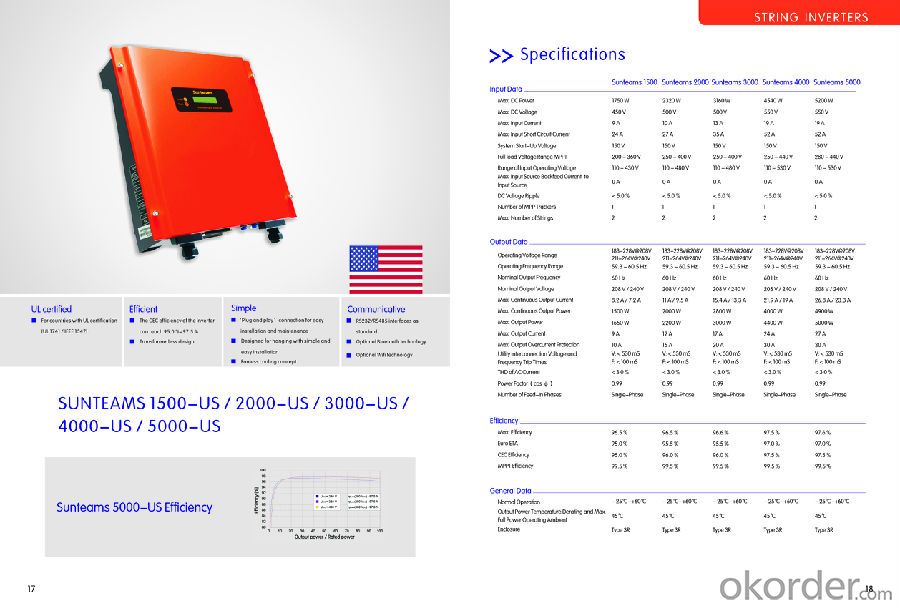
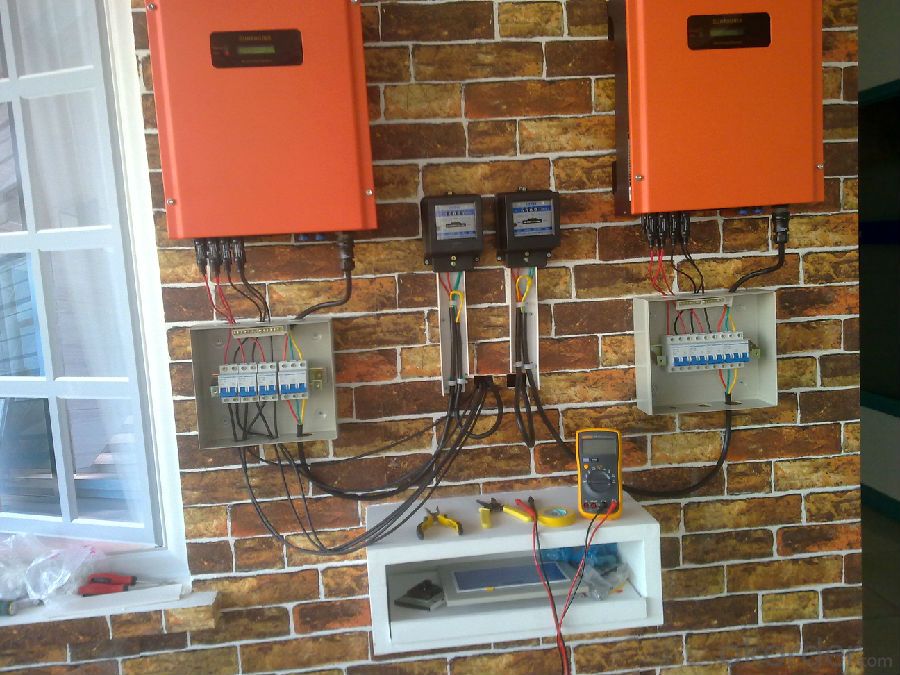
- Q: What is the role of a surge protector in a solar inverter?
- The role of a surge protector in a solar inverter is to protect the inverter and other connected devices from power surges or voltage spikes that can occur in the electrical system. It helps to regulate and stabilize the incoming electricity, preventing damage to the inverter and ensuring the smooth and efficient operation of the solar power system.
- Q: Can a solar inverter be used in mobile or portable solar systems?
- Yes, a solar inverter can be used in mobile or portable solar systems. Solar inverters are essential components that convert the direct current (DC) generated by solar panels into alternating current (AC) that can be used to power various devices. They are designed to be adaptable and can be used in a wide range of applications, including mobile or portable solar systems. This allows individuals to harness solar energy and use it to power their devices wherever they go, making it a convenient and sustainable solution for on-the-go power needs.
- Q: What is the role of a frequency regulation feature in a solar inverter?
- The role of a frequency regulation feature in a solar inverter is to ensure that the power output from the solar panels matches the grid's frequency and voltage requirements. It helps maintain a stable and consistent frequency, allowing for seamless integration of solar power into the existing electrical grid.
- Q: How long does it take to install a solar inverter?
- The time it takes to install a solar inverter can vary depending on various factors such as the complexity of the installation, the size of the system, and the experience of the installer. On average, it typically takes a few hours to a full day to complete the installation process.
- Q: Can a solar inverter be used with a generator as a backup power source?
- Yes, a solar inverter can be used with a generator as a backup power source. The solar inverter can be connected to the generator's power output, allowing it to convert the generator's AC power into usable DC power for the solar panels. This enables the solar panels to continue generating electricity even when there is no sunlight, providing a reliable backup power supply.
- Q: What is the role of voltage regulation in a solar inverter?
- The role of voltage regulation in a solar inverter is to ensure that the output voltage of the inverter remains stable and within a certain range, regardless of fluctuations in the input voltage from the solar panels. This is important as it allows the inverter to effectively convert the DC power generated by the solar panels into AC power that can be used by household appliances or fed back into the grid. Voltage regulation helps protect the connected devices from voltage spikes or drops, optimizes the performance of the inverter, and ensures the safe and efficient operation of the entire solar power system.
- Q: How does a solar inverter handle reactive power?
- A solar inverter handles reactive power by implementing power factor correction technology. It actively measures the power factor of the system and adjusts the reactive power to ensure optimal performance and efficient energy conversion. This helps in maintaining a balanced and stable grid connection while minimizing power losses.
- Q: Can a solar inverter be used with smart home systems?
- Yes, a solar inverter can be used with smart home systems. Many modern solar inverters are designed to integrate with smart home technology, allowing homeowners to monitor and control their solar energy production and consumption through their smart devices. This integration enables better management of energy usage, optimization of solar power generation, and the ability to remotely monitor and adjust the inverter settings for improved efficiency and convenience.
- Q: Can a solar inverter be used in locations with high humidity or extreme temperatures?
- Yes, solar inverters can be used in locations with high humidity or extreme temperatures. However, it is important to choose an inverter specifically designed for such conditions. High-quality inverters are built to withstand these environmental factors and often have protection features to ensure reliable performance and longevity in harsh climates.
- Q: Can a solar inverter be used in extreme weather conditions?
- Yes, solar inverters are designed to withstand extreme weather conditions. They are built to be durable and resistant to factors such as temperature fluctuations, humidity, and harsh weather elements. However, it is always recommended to consult the manufacturer's guidelines to ensure proper installation and protection measures are in place for specific weather conditions.
Send your message to us
Ryobi Solar Inverter Sunteams 4000 On Grid Inverter with WiFi US Standard
- Loading Port:
- Shanghai
- Payment Terms:
- TT OR LC
- Min Order Qty:
- -
- Supply Capability:
- 10000 set/month
OKorder Service Pledge
Quality Product, Order Online Tracking, Timely Delivery
OKorder Financial Service
Credit Rating, Credit Services, Credit Purchasing
Similar products
Hot products
Hot Searches
Related keywords
